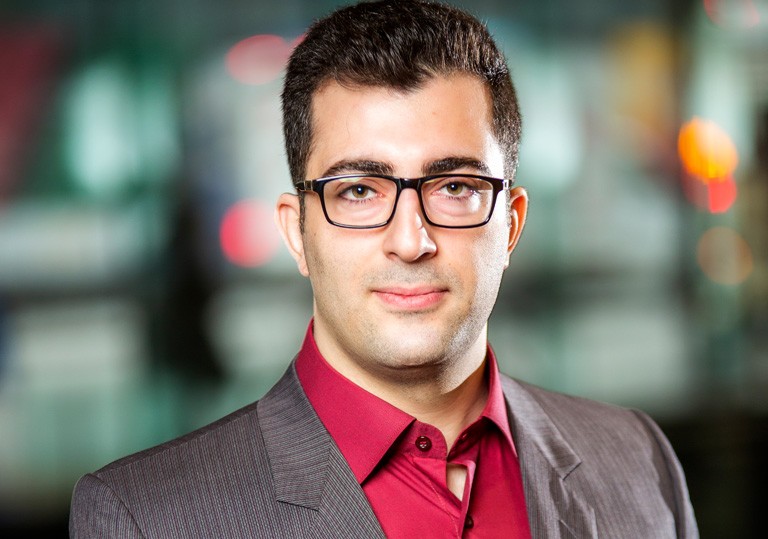Concordia students explore bereavement through photography, and machine learning for improved rehab technologies
 Felicity T. C. Hamer: “My research focuses on memory, imagination and bereavement through photography.”
Felicity T. C. Hamer: “My research focuses on memory, imagination and bereavement through photography.”
Felicity T. C. Hamer and Soroosh Shahtalebi — Concordia doctoral candidates in communications studies and information systems engineering, respectively — are the latest recipients of the university’s Stand-Out Graduate Research Awards.
The prize is offered twice a year to students who have made exceptional research contributions in the categories of Fine Arts, Humanities and Social Sciences, and Engineering, Medical Sciences and Natural Sciences.
Winners are chosen based on the importance of their research as well as their ability to communicate its relevance to the general public. They must also have applied to one of the Fonds de Recherche du Québec’s Relève étoile awards.
The award is valued at $1,000 per person with an additional top-up of $500 if the research is also selected for the Relève étoile.
Memory, bereavement and imagination through photography
At an unprecedented time, when COVID-19 is ending the lives of so many, it’s both relevant and important to consider the tools available to mourn these losses.
Hamer’s dissertation, “Developing Memory: Remembrance, Embellishment, Hauntography,” looks at the complex ways in which photographic portraits extend relationships beyond death.
Her recent book Parental Grief and Photographic Remembrance, for which she received the Stand-Out Award, is the second in the series “Sharing Death Online.” It examines the challenges unique to those grieving the loss of a child.
“My research focuses on memory, imagination and bereavement through photography,” Hamer says. “I look at emotional engagement with photographs, supernatural and miraculous imagery and the intersections of religion and photography.”
Working under the supervision of Jeremy Stolow, associate professor of Communication Studies, Hamer is exploring the concept of what she calls “hauntography,” in which photographic mementos become so enmeshed in imaginative remembrance that, even when misplaced or intentionally avoided, they retain a powerful affective charge.
“Memory is not linear,” she continues. “We are continually jumping around in time, revisiting past experiences in the present. Remembrance can feel as though it entails a backwards kind of reflection, whereas imagining is often associated with the future.”
Hamer adds that parental bereavement and remembering a lost child complicates this process — as what is remembered is perhaps inseparable from the fantasy of what could have been.
 Soroosh Shahtalebi: “Our research is about trying to enhance the reliability and performance of assistive devices.”
Soroosh Shahtalebi: “Our research is about trying to enhance the reliability and performance of assistive devices.”
Rehabilitation technologies for neurological disorders
Shahtalebi is pursuing his doctorate at the Concordia Institute for Information Systems Engineering under the supervision of Arash Mohammadi, an assistant professor. He is a member of the Intelligent Signal and Information Processing Laboratory and is working on applying machine learning solutions to problems in medicine and health care.
“I’m investigating novel signal processing and machine learning solutions to enhance the performance and reliability of rehabilitation technologies,” Shahtalebi explains.
“We’re looking to develop advanced computer-aided frameworks to assist physicians in the diagnosis and treatment of neurological disorders.”
The world population of seniors (over the age of 60) is expected to increase to approximately 2.1 billion by 2050. The parallel rise in age-related disorders such as Parkinson’s disease could lead to a worldwide health crisis.
Pathological hand tremors (PHT) are a common symptom of such disorders and can severely affect patients’ quality of life. Such tremors can make it nearly impossible for patients to feed and care for themselves, even if other symptoms are still relatively minor.
“Our research, referred to as PHTNet — published in the journal Scientific Reports — is about trying to enhance the reliability and performance of assistive devices and expand the population of patients that could benefit from rehabilitation technologies,” Shahtalebi says.
“Such advancements could help minimize the caregiver burden and prolong the period of self-sufficiency for those suffering from these diseases.”
Enabling patients to stay self-sufficient for longer could help to both improve their quality of life and reduce the tremendous financial and emotional costs linked with these age-related diseases.
Find out more about Concordia’s School of Graduate Studies.



